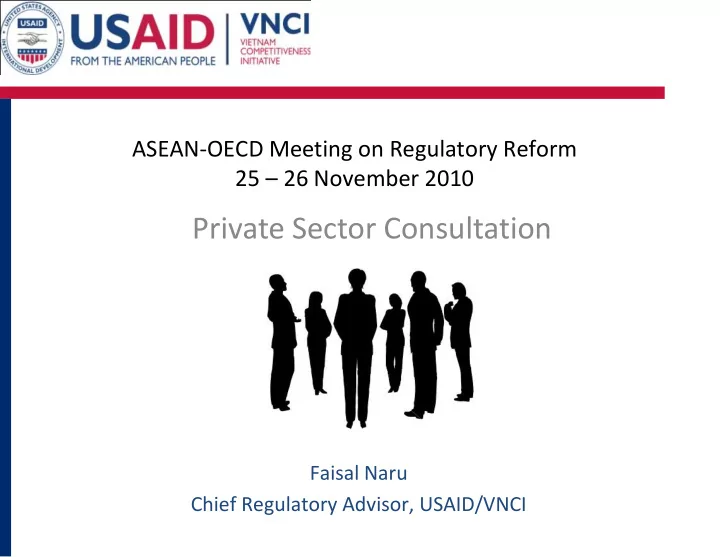

ASEAN-OECD Meeting on Regulatory Reform 25 – 26 November 2010 Private Sector Consultation Faisal Naru Chief Regulatory Advisor, USAID/VNCI
Private Sector Consultation Agenda 1. Why Consult? 2. UK Consultation Code 3. Private Sector Consultation Mechanisms 4. UK Consultation Bodies 5. Beyond Public Private Dialogue - Partnership
Why Consult? Help Government to: • develop effective solutions; • identify the full range of affected parties; • minimise the risk of unexpected consequences; and • to discover better implementation methods.
Why Consult? Increase trust and engagement with stakeholders because consultation: • promotes transparency and accountability; • improves awareness and understanding of the policy area, and can address assumptions; and • encourages public ownership of the policy, therefore increasing public commitment to it.
Tonic Wine Industry
Effective Consultation Asking the right questions Asking the right people Listening to the answers
UK Consultation Code The Seven Consultation Criteria 1. When to consult 2. Duration of consultation exercises 3. Clarity of scope and impact 4. Accessibility of consultation exercises 5. The burden of consultation 6. Responsiveness of consultation exercises 7. Capacity to consult
Private Sector Consultation Mechanisms Informal consultation Notification Circulation for comments Public notice-and-comment Public hearing Advisory bodies Business test panels Source: Public Consultation, Developing Alternatives – Delia Rodrigo
UK Public Private Advisory Bodies • Better Regulation Task Force (1997) • Better Regulation Commission (2006) " To advise the Government on action to reduce unnecessary regulatory and administrative burdens, and ensure that regulation and its enforcement are proportionate, accountable, consistent, transparent and targeted. "
Jammy Dodger
Partnerships: Beyond Public Private Dialogue
The RRAC (Risk & Regulation Advisory Council) is an independent council set up in January 2008 to carry on consideration of public risk issues undertaken by the Better Regulation Commission, which it has replaced. The creation of the RRAC was welcomed by the National Consumer Council, CBI, and TUC among others, and the Prime Minister asked the RRAC to work with government to develop a better understanding of public risk , and how best to respond to it, and to work with non- governmental stakeholders to help foster a more considered approach to public risk and policy making.
The Government invites the Regulatory Policy Committee: a) to comment on the quality of analysis supporting policy decisions on new regulations, and on whether the policy design will ensure the benefits justify the costs, including: • the accuracy and robustness of the costs and benefits; • whether the range of policy options assessed support minimising costs and maximising benefits; and • the degree to which issues of public risk and the practicalities of ensuring compliance are taken into account. b) to review, advise and comment on the performance of regulators against the Hampton principles. The Committee will not comment on the Government’s policy objectives, which are a matter for Ministers, but will focus on the cost-effectiveness of the instruments to deliver them
Better Regulation Strategy Group The Better Regulation Strategy Group was set up in the first quarter of 2010, by the Better Regulation Executive's Non-Executive Chair, Sir Don Curry. It is a stakeholder advisory group that acts as a critical friend to help shape the BRE's long-term strategy and define what success should look like.
Salt, Fat and Sugar
Any Questions? Faisal Naru Email: Faisal_Naru@dai.com narooster@yahoo.com
Recommend
More recommend